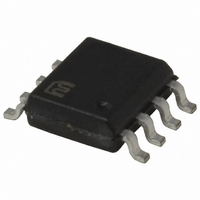MIC184YM Micrel Inc, MIC184YM Datasheet - Page 16

MIC184YM
Manufacturer Part Number
MIC184YM
Description
IC SUPERVISOR LOCAL/REMOTE 8SOIC
Manufacturer
Micrel Inc
Datasheet
1.MIC184YM.pdf
(20 pages)
Specifications of MIC184YM
Output Type
I²C™/SMBus™
Lead Free Status
Lead free
Function
Temp Monitoring System (Sensor)
Topology
ADC (Sigma Delta), Register Bank
Sensor Type
External & Internal
Sensing Temperature
-55°C ~ 125°C, External Sensor
Output Alarm
Yes
Output Fan
No
Voltage - Supply
2.7 V ~ 5.5 V
Operating Temperature
-55°C ~ 125°C
Mounting Type
Surface Mount
Package / Case
8-SOIC (3.9mm Width)
Temperature Sensor Function
Temp Sensor
Package Type
SOIC
Operating Temperature (min)
-55
Operating Temperature (max)
125C
Operating Temperature Classification
Military
Operating Supply Voltage (min)
2.7V
Operating Supply Voltage (typ)
3.3/5V
Operating Supply Voltage (max)
5.5V
Lead Free Status / RoHS Status
Compliant
Other names
576-1676-5
MIC184YM
MIC184YM
Available stocks
Company
Part Number
Manufacturer
Quantity
Price
Company:
Part Number:
MIC184YM
Manufacturer:
MICREL
Quantity:
263
Company:
Part Number:
MIC184YM TR
Manufacturer:
MICREL
Quantity:
2 500
Company:
Part Number:
MIC184YM-TR
Manufacturer:
RCA
Quantity:
6 221
Company:
Part Number:
MIC184YMM
Manufacturer:
FSC
Quantity:
764
MIC184
These routines force the device under test to generate an
overtemperature fault (steps 3 and 4), followed by an under-
temperature fault (steps 6 through 8). This sequence causes
the device under test to exit the routine prepared to respond
to an overtemperature condition. If being immediately pre-
pared to detect an undertemperature condition upon exit is
desired, swap steps 3 and 6 in each routine.
Remote Diode Selection
Most small-signal PNP transistors with characteristics similar
to the JEDEC 2N3906 will perform well as remote tempera-
ture sensors. Table 3 lists several examples of such parts.
Micrel has tested those marked with a bullet for use with the
MIC184.
Minimizing Errors
Self-Heating
One concern when using a part with the temperature accuracy
and resolution of the MIC184 is to avoid errors induced by
MIC184
2. Write 0000 0010b (02h) to the CONFIG register.
3. Write 1100 1000 1000 0000b = C880h to T_SET
4. Wait t
5. Read the contents of the CONFIG register:
6. Write 0111 1111 1000 0000b = 7F80h to T_SET
7. Wait an additional t
8. Read CONFIG again, to clear the interrupt
9. Based on the results of the test in step (4), do
{END}
from the device under test.
and T_HYST. This corresponds to -55.5°C.
least one A/D conversion.
a) If the part is an MIC184, the MSB will be set
b) If the part is a conventional LM75-type part,
and T_HYST. This corresponds to +127.5°C.
second conversion.
request from step (7). This will also clear STS, if
the part under test is an MIC184.
the following four steps within 50ms total:
a) Set the CONFIG register as required.
b) Load T_HYST with its operational value.
c) Load T_SET with its operational value.
d) Re-enable the host’s interrupt handling input
to one (CONFIG = 82h).
the MSB will be zero (CONFIG = 02h).
from the part under test.
conv
(160ms max.) for the part to finish at
Table 5. Transistors Suitable for Remote Temperature Sensing Use
conv
Vendor
Fairchild
On Semiconductor
Phillips Semiconductor
Rohm Semiconductor
Samsung
Zetex
for the part to finish a
Part Number
MMBT3906
MMBT3906L
PMBT3906
SST3906
KST3906-TF
FMMT3906
16
self-heating (V
error this might represent, and how to reduce that error, the
dissipation in the MIC184 must be calculated, and its effects
examined as a temperature error.
In most applications, the INT output will be low for at most a
few milliseconds before the host sets it back to the high state,
making its duty cycle low enough that its contribution to self-
heating of the MIC184 is negligible. Similarly, the DATA pin
will in all likelihood have a duty cycle of substantially below
25% in the low state. These considerations, combined with
more typical device and application parameters, allow the
following calculation of typical device self-heating in inter-
rupt-mode:
If the part is to be used in comparator mode, calculations
similar to those shown above (accounting for the expected
value and duty cycle of I
the device’s self-heating error.
In any application, the best test is to verify performance
against calculation in the final application environment. This
is especially true when dealing with systems for which some
of the thermal data, (for example, PC board thermal conduc-
tivity and/or ambient temperature), may be poorly defined or
unavailable except by empirical means.
Series Resistance
The operation of the MIC184 depends upon sensing the
ΔV
two different current levels. For remote temperature mea-
surements, this is done using an external diode connected
between A2/T1 and ground.
Since this technique relies upon measuring the relatively small
voltage difference resulting from two levels of current through
the external diode, any resistance in series with the external
diode will cause an error in the temperature reading from the
MIC184. A good rule of thumb is this: for each ohm in series
with the external transistor, there will be a 0.9°C error in the
MIC184's temperature measurement. It is not difficult to keep
the series resistance well below an ohm (typically 0.1Ω), so
CB-E
P
P
ΔT
ΔT
D
D
of a diode-connected PNP transistor ("diode") at
J
J
1% I
1% × 1.5mA × 0.3V)
= (I
= (0.3mA × 3.3V + 25% × 1.5mA × 0.3V +
= 1.11mW × 206°C/W
relative to T
Package
SOT-23
SOT-23
SOT-23
SOT-23
SOT-23
SOT-23
DD(typ.)
OL(int)
DD
× I
0.3V)
DD
3.3V + 25% I
). In order to understand what level of
A
Tested
is 0.23°C
OL(int)
) will give a good estimate of
OL(data)
0.3V +
May 2006
Micrel












